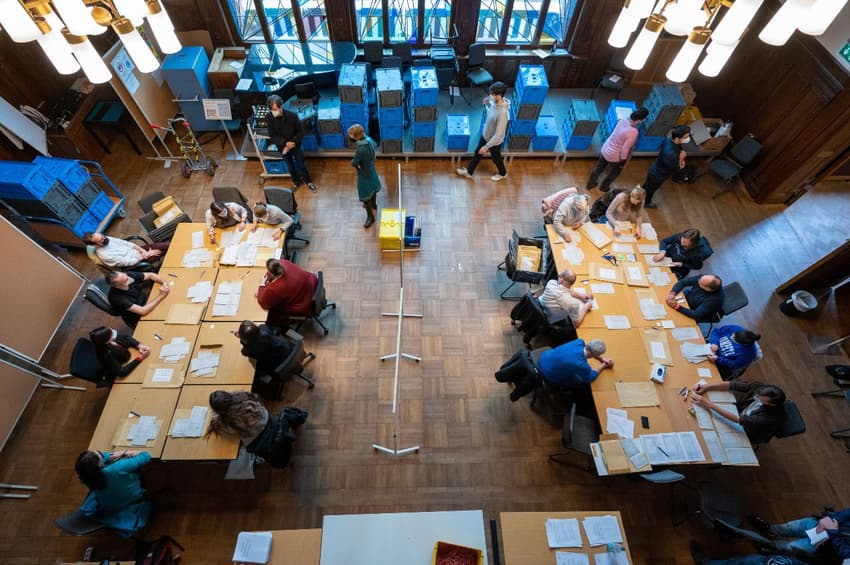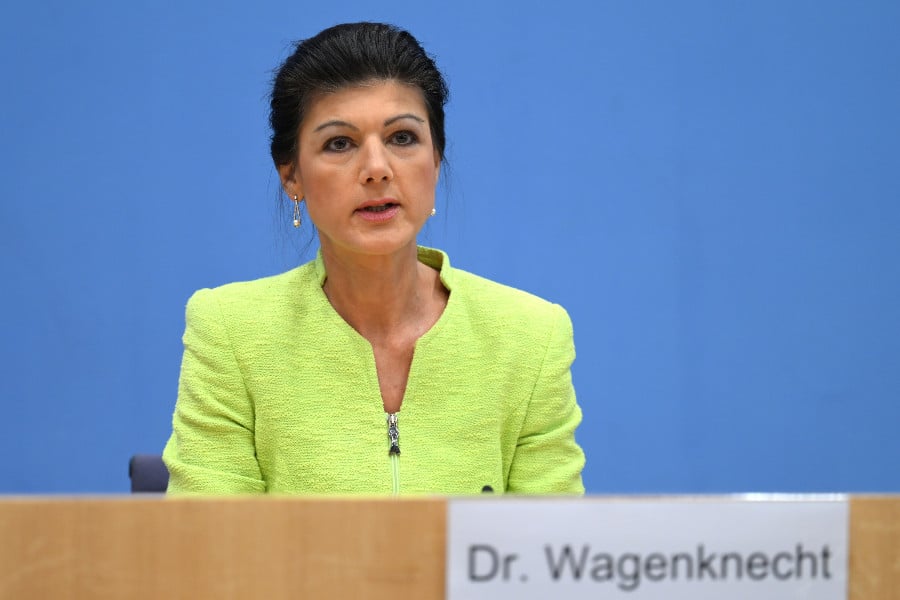What to know about Berlin's unusual election rerun on Sunday

Sunday will see many Berliners go to the polls for a second time in a rerun of the 2021 parliamentary elections. Here's why the revote is happening the first place - and what the outcome could be.
What's going on?
Halfway through the parliamentary term, Berlin is set to hold a repeat of the federal elections that originally took place in a shambolic fashion on September 26th, 2021.
On the back of a decision by the Constitutional Court in Karlsruhe, votes will be reheld at 455 of Berlin's 2256 polling stations, with the electorate deciding which parties and MPs they want to represent their interests in the Bundestag.
When voters go to the polls on Sunday, it will be the first repeat election ordered by the Constitutional Court in German history.
Voters in all of Berlin's boroughs will be asked to attend the revote, but the impact will be felt far more in some boroughs than others. In Pankow, for example, 85 percent of polling stations will be re-running the 2021 election, while in Lichtenberg the figure is only 2.9 percent.
Why are the elections being reheld?
When the original federal elections took place in Berlin more than two years ago, they did so on what was known as a 'Superwahltag' or super election day.
Alongside the federal elections, Berliners were also tasked with electing officials in the state and local elections, as well as tackling a referendum on whether to expropriate properties from major landlords like Deutsche Wohnen.
As if that weren't enough, the Berlin marathon had also been organised for the same day, meaning numerous roads were blocked throughout the city, making it hard to deliver and refill ballot papers.
When many voters arrived at their local polling booths, they were met with pandemonium: some stations opened late or shut early, others ran out of ballot papers as long queues formed outside, while some even handed out ballots with the wrong candidates listed on them.
After the polling stations closed for the day, the chaos meant that some votes were even counted in the wrong districts, leading to fears that the mayhem of election day had dramatically skewed the results.
READ ALSO: Why Berlin could vote again after 2021 election disaster
Following a similar ruling in the Berlin constitutional court, the German capital also reheld its state and district elections in February last year.
The reheld vote saw the Social Democrats (SPD) - traditionally a dominant force in Berlin politics - recieve a historically low share of the vote, while the Christian Democratic Union (CDU) party took over as the largest coalition party in a Grand Coalition with the SPD.
Are there new candidates this year?
No. One of the oddities of the repeat elections is that, almost two and a half years later, all the candidates must remain the same.
According to the Constitution Court, the ballot papers have to look exactly as they did in 2021, meaning parties weren't allowed to put forward new candidates.

A CDU candidate puts up a poster near the Victory Column in Berlin. Photo: picture alliance/dpa | Annette Riedl
That means, for instance, that former AfD MP Birgit Malsack-Winkemann is officially standing again. Malsack-Winkemann was arrested as part of a large-scale raid in December 2022 and is currently in custody. The former AfD politician stands accused of joining a far-right terrorist cell who plotted to overthrow German democracy.
For other candidates, the information on the ballots will be out of date. For example, SPD candidate Michael Müller is on the ballot paper with the job title of governing mayor - an office he no longer holds.
Who is allowed to vote?
While local and European elections can be voted on by anyone with an EU passport, the federal elections are reserved for German citizens, meaning only those with a German passport who are over the age of 18 will be able to vote.
However, though the elections are meant to be a repeat of September 2021, people don't need to have voted the first time around to be eligible to vote on Sunday.
That means that people who have recently turned 18 or newly naturalised as Germans can take part in the new elections, provided their local constituency is part of the revote.
People who've recently moved to Berlin from, say, Munich or Hamburg, could also take part in the vote, despite having voted elsewhere the first time around.
What sort of impact could this have?
It's possible that a few politicians could lose their seats in the Bundestag - though the impact will be nowhere as big as it could have been.
Had the Constitutional Court decided that the entirety of Berlin needed to rehold the vote - as was the case in the state and local elections - the position of the left-wing Die Linke would have been under threat.
That's because the party barely made it over the five-percent threshold and number of direct mandates required to enter the Bundestag, so the re-election of just one of its three Berlin MPs would have led to it being kicked out.

Former Die Linker MP Sahra Wagenknecht speaks at a press conference. Photo: picture alliance/dpa | Soeren Stache
Given that she and her fellow party founders entered parliament as part of Die Linke, Sahra Wagenknecht's newly formed leftist and migrant-sceptic party would have also been under threat.
READ ALSO: Why is a German populist left leader launching a new political party?
As it stands, however, the relatively small number of constituencies voting means the elections are unlikely to change the make-up of parliament as a whole.
The number of seats given to each party in the Bundestag is decided based on a party's national vote share and the weighting of votes in different states. Depending on voter turnout and the election results, that means a few MPs could be replaced either by Berlin candidates or even MPs from another federal state.
Comments
See Also
What's going on?
Halfway through the parliamentary term, Berlin is set to hold a repeat of the federal elections that originally took place in a shambolic fashion on September 26th, 2021.
On the back of a decision by the Constitutional Court in Karlsruhe, votes will be reheld at 455 of Berlin's 2256 polling stations, with the electorate deciding which parties and MPs they want to represent their interests in the Bundestag.
When voters go to the polls on Sunday, it will be the first repeat election ordered by the Constitutional Court in German history.
Voters in all of Berlin's boroughs will be asked to attend the revote, but the impact will be felt far more in some boroughs than others. In Pankow, for example, 85 percent of polling stations will be re-running the 2021 election, while in Lichtenberg the figure is only 2.9 percent.
Why are the elections being reheld?
When the original federal elections took place in Berlin more than two years ago, they did so on what was known as a 'Superwahltag' or super election day.
Alongside the federal elections, Berliners were also tasked with electing officials in the state and local elections, as well as tackling a referendum on whether to expropriate properties from major landlords like Deutsche Wohnen.
As if that weren't enough, the Berlin marathon had also been organised for the same day, meaning numerous roads were blocked throughout the city, making it hard to deliver and refill ballot papers.
When many voters arrived at their local polling booths, they were met with pandemonium: some stations opened late or shut early, others ran out of ballot papers as long queues formed outside, while some even handed out ballots with the wrong candidates listed on them.
After the polling stations closed for the day, the chaos meant that some votes were even counted in the wrong districts, leading to fears that the mayhem of election day had dramatically skewed the results.
READ ALSO: Why Berlin could vote again after 2021 election disaster
Following a similar ruling in the Berlin constitutional court, the German capital also reheld its state and district elections in February last year.
The reheld vote saw the Social Democrats (SPD) - traditionally a dominant force in Berlin politics - recieve a historically low share of the vote, while the Christian Democratic Union (CDU) party took over as the largest coalition party in a Grand Coalition with the SPD.
Are there new candidates this year?
No. One of the oddities of the repeat elections is that, almost two and a half years later, all the candidates must remain the same.
According to the Constitution Court, the ballot papers have to look exactly as they did in 2021, meaning parties weren't allowed to put forward new candidates.

That means, for instance, that former AfD MP Birgit Malsack-Winkemann is officially standing again. Malsack-Winkemann was arrested as part of a large-scale raid in December 2022 and is currently in custody. The former AfD politician stands accused of joining a far-right terrorist cell who plotted to overthrow German democracy.
For other candidates, the information on the ballots will be out of date. For example, SPD candidate Michael Müller is on the ballot paper with the job title of governing mayor - an office he no longer holds.
Who is allowed to vote?
While local and European elections can be voted on by anyone with an EU passport, the federal elections are reserved for German citizens, meaning only those with a German passport who are over the age of 18 will be able to vote.
However, though the elections are meant to be a repeat of September 2021, people don't need to have voted the first time around to be eligible to vote on Sunday.
That means that people who have recently turned 18 or newly naturalised as Germans can take part in the new elections, provided their local constituency is part of the revote.
People who've recently moved to Berlin from, say, Munich or Hamburg, could also take part in the vote, despite having voted elsewhere the first time around.
What sort of impact could this have?
It's possible that a few politicians could lose their seats in the Bundestag - though the impact will be nowhere as big as it could have been.
Had the Constitutional Court decided that the entirety of Berlin needed to rehold the vote - as was the case in the state and local elections - the position of the left-wing Die Linke would have been under threat.
That's because the party barely made it over the five-percent threshold and number of direct mandates required to enter the Bundestag, so the re-election of just one of its three Berlin MPs would have led to it being kicked out.

Given that she and her fellow party founders entered parliament as part of Die Linke, Sahra Wagenknecht's newly formed leftist and migrant-sceptic party would have also been under threat.
READ ALSO: Why is a German populist left leader launching a new political party?
As it stands, however, the relatively small number of constituencies voting means the elections are unlikely to change the make-up of parliament as a whole.
The number of seats given to each party in the Bundestag is decided based on a party's national vote share and the weighting of votes in different states. Depending on voter turnout and the election results, that means a few MPs could be replaced either by Berlin candidates or even MPs from another federal state.
Join the conversation in our comments section below. Share your own views and experience and if you have a question or suggestion for our journalists then email us at [email protected].
Please keep comments civil, constructive and on topic – and make sure to read our terms of use before getting involved.
Please log in here to leave a comment.